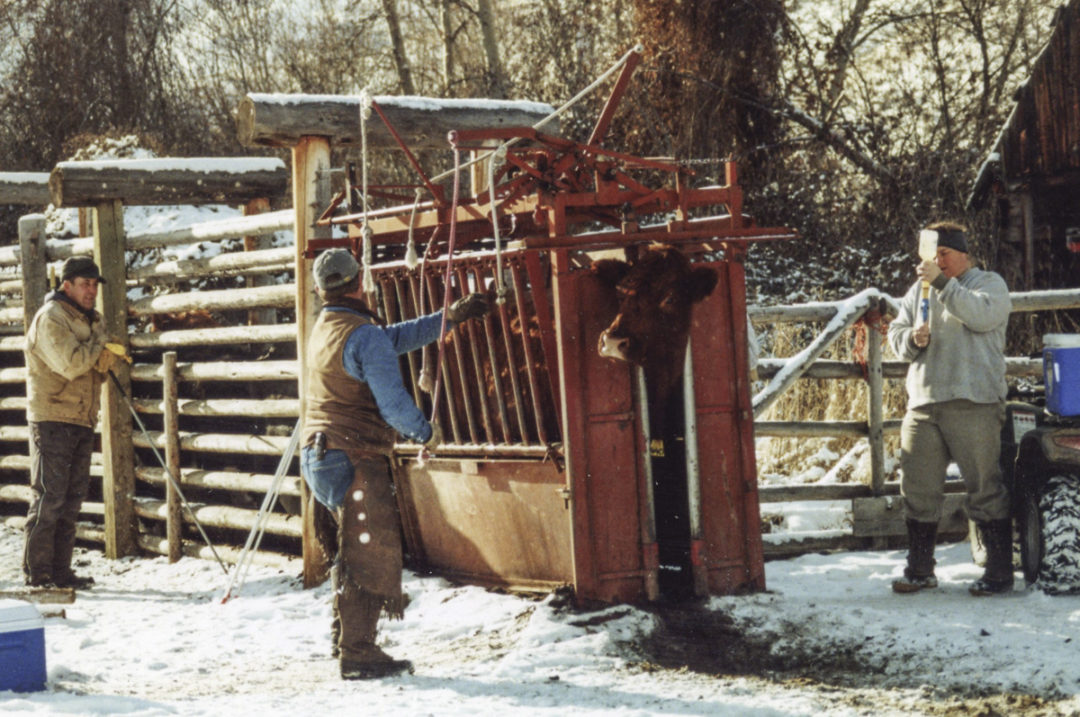Calves are born with very little natural immunity against diseases. Unlike human babies who obtain some of the mother’s antibodies via her bloodstream, there is no crossover via the bovine placenta. Mother Nature has that covered, however, by providing those antibodies in the dam’s colostrum. Calves have a better chance of staying healthy during the first weeks of life if they get an adequate amount of good-quality colostrum soon after birth. If the dam has a chance to build high antibody levels before calving, she can pass this temporary immunity to her calf.
Preventing calf disease involves many factors, including clean environment (low level of pathogens for the calf to pick up) and healthy cows with strong immunities. Vaccinating cows ahead of calving can help build peak antibody levels to make sure their colostrum contains adequate protective antibodies.
George Barrington, veterinarian and professor at Washington State University, says it’s important to make sure all calves get off to a good start with adequate colostrum. “This means good nutrition for the cows and heifers so they can build good colostrum, making sure the calves get up and nurse quickly, etc. The problem with vaccinating is that people tend to think it will solve all the problems, but you can’t out-vaccinate poor management. This tool must be used in conjunction with, rather than in place of, good management,” he says.
“The current vaccines for rotavirus, coronavirus and the E. coli monoclonal antibodies all have their place, but overemphasizing those rather than practicing good management is generally a mistake,” says Barrington.
Clostridial toxoids, particularly C. perfringens types C and D, can also be helpful in some herds, protecting calves against acute and deadly enterotoxemia – a gut infection that often kills calves so quickly that they can die even before they start showing evidence of scours.
Clostridial infections can happen at any time, from newborns through several months of age. It can hit older calves that no longer have immunity left from maternal antibodies in the colostrum, so vaccinating cows ahead of calving may be less effective. In those herds, it pays to vaccinate the calves themselves. In other cases, vaccination won’t help at all if it happens to be a type of C. perfringens that is not contained in the 7- or 8-way clostridial vaccines.
Type C and D are the common ones, but there is also type A and a couple others that can sometimes be a factor in calf gut infections, and they are not included in the vaccine, according to Barrington. This would be a situation where you’d need to work with your veterinarian and possibly have some lab work to know what you are dealing with, and in some situations, have an autogenous vaccine created.
 Vaccinating cattle before calving can help establish a stronger immune system once the calf is born. Photo provided by Heather Smith Thomas.
Vaccinating cattle before calving can help establish a stronger immune system once the calf is born. Photo provided by Heather Smith Thomas.Steve Hendrick, a veterinarian in Coaldale, Alberta, says scours vaccines can be beneficial in herds that have certain problems, but there are limitations regarding what they cover. “Some herds have problems with salmonella, coccidiosis, cryptosporidiosis and other diseases for which there are no vaccines. The pre-calving vaccines we give will not be a cure-all against every type of scours,” he says. The important thing is to have healthy cows with strong immune systems to produce strong calves that can take full advantage of antibodies in colostrum.
Regarding scour vaccines, there are several brands and types on the market. “Talk with your vet to know what might be recommended in your situation. The timing for these may also differ, depending on the type of vaccine,” Hendrick says.
Make a plan, in consultation with your veterinarian, regarding what product to use and when, depending on when it is feasible to have the cows accessible for vaccinating. Some ranch facilities and calving seasons will dictate what is practical.
“I hesitate to specify use of any certain vaccine, but some are oil-based and can be given farther ahead of calving – I prefer these, just because you are not putting heavily pregnant cows through the chute. The water-based vaccines must be given closer to calving,” he says. Immunity gained doesn’t last as long.
Oil-based vaccines can actually be given as far ahead as preg-check time in the fall. For heifers that need a booster to gain adequate immunity their first year, that booster can be given closer to calving.
Scott Poock, a University of Missouri extension veterinarian, has cattle of his own. “We give the first round to our heifers in early December, and booster that with another vaccination four weeks later," he says. "We calve our heifers about two weeks before the cows, so about two weeks after the heifers’ booster, we vaccinate the cow herd."
“Some scours vaccines must be given within four weeks of calving; they have a short window of time. I prefer to use the ones that have a longer window and not have to put the cattle through the chute too close to calving. We try to use products that can be given a bit earlier, but you have to get the vaccines into the heifers twice that first year. After that, they simply need an annual booster,” says Poock. If you skip a year or two during the life of a cow, however, and then come back with another vaccination, it may not give as much protection. He recommends starting over with a two-shot series.
“In our herd, we try to keep the calving season pretty tight, and then we don’t have to revaccinate the later ones.” In a herd with a longer calving season, or if you don’t know when they are going to calve, you probably need to repeat with another booster for the later-calving cows to get the benefit from vaccination.
Pre-calving vaccines can be helpful in many calving programs, but the mistake some people make is only giving a first-calf heifer one dose and no booster. “One dose doesn’t stimulate very much immune response, but after the second dose, she gets a huge boost, and then the next year she only needs one shot to get a huge boost,” says Poock. If you don’t give the initial two-dose series, you are basically wasting your money for the vaccine, he says.
Building good immunity in your herd is not so much the products you use but how you use them. A good product can be worthless if you handle it improperly. Pre-calving vaccines are often given in winter, which can be challenging if vaccines get too cold or syringes get cold and needles freeze up.
“I was at one place where the crew was vaccinating and trying to prevent that problem by heating the needle ahead of time with a torch to keep it from freezing,” says Hendrick. “That wasn’t good for the vaccine! There are better ways to deal with this; a person needs to make sure the vaccine isn’t getting too warm in the process.”
Most scours vaccine products are fairly thick and viscous and slow to go through the gun. “You need to use a needle the appropriate diameter so it can go through, and also wait a bit before you release the trigger. Take time to let the thick fluid go through the needle while it is still in the animal before you withdraw the syringe. You need to relax your grip and wait a second before withdrawing it. Give it time to go in there.”
The vaccine will be ineffective if you lose very much of it. “The scours vaccines are only a 2-milliliter dose anyway, so if you lose part of it, you won’t have enough in the animal to do much good,” says Hendrick.












